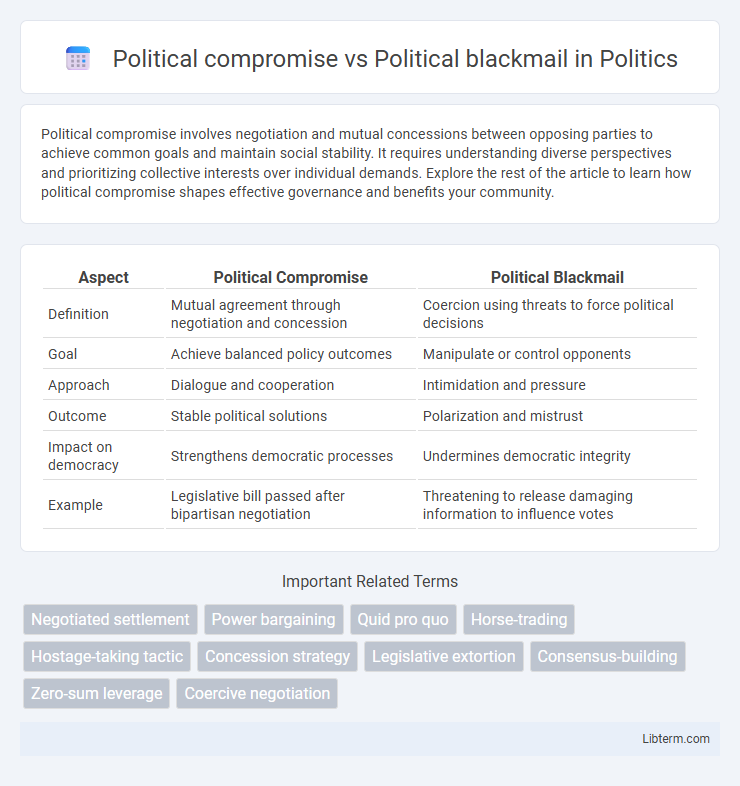Political compromise involves negotiation and mutual concessions between opposing parties to achieve common goals and maintain social stability. It requires understanding diverse perspectives and prioritizing collective interests over individual demands. Explore the rest of the article to learn how political compromise shapes effective governance and benefits your community.
Table of Comparison
| Aspect | Political Compromise | Political Blackmail |
|---|---|---|
| Definition | Mutual agreement through negotiation and concession | Coercion using threats to force political decisions |
| Goal | Achieve balanced policy outcomes | Manipulate or control opponents |
| Approach | Dialogue and cooperation | Intimidation and pressure |
| Outcome | Stable political solutions | Polarization and mistrust |
| Impact on democracy | Strengthens democratic processes | Undermines democratic integrity |
| Example | Legislative bill passed after bipartisan negotiation | Threatening to release damaging information to influence votes |
Defining Political Compromise
Political compromise involves mutual concessions between opposing parties to achieve a balanced and functional agreement that serves the broader public interest. It prioritizes dialogue, negotiation, and the willingness to adjust positions for collective progress. Unlike political blackmail, which uses threats or undue pressure to force decisions, political compromise fosters cooperation and sustainable governance.
Understanding Political Blackmail
Political blackmail involves using threats, coercion, or manipulation to force opponents into decisions against their will, undermining democratic principles and creating toxic political environments. Unlike political compromise, which seeks mutual agreement through negotiation and respect, blackmail erodes trust and destabilizes governance by prioritizing power over dialogue. Understanding political blackmail requires recognizing the tactics employed, such as withholding critical support or spreading misinformation, to resist and promote ethical political engagement.
Key Differences Between Compromise and Blackmail
Political compromise involves mutual concessions where conflicting parties negotiate to reach a balanced agreement, fostering cooperation and stability. In contrast, political blackmail relies on coercion, threats, or manipulation to force a party into submission, undermining trust and democratic principles. Key differences include the voluntary nature of compromise versus the coercive tactics of blackmail, and the aim of equitable resolution compared to exploitation for power or gain.
Historical Examples of Political Compromise
Political compromise has often shaped historical outcomes, exemplified by the Missouri Compromise of 1820, which balanced slave and free states to maintain national unity. In contrast, political blackmail exploits threats or coercion to force decisions, as seen during the Teapot Dome scandal where private interests blackmailed government officials for oil leases. The success of political compromise lies in negotiated agreements that accommodate diverse interests, while blackmail undermines democratic processes through intimidation and corruption.
Notable Cases of Political Blackmail
Political blackmail involves coercing political figures through threats or revealing damaging information to influence decisions, often undermining democratic processes. Notable cases include the Watergate scandal, where illegal surveillance and blackmail attempts aimed to sabotage political opponents, and the Lewinsky scandal, which involved leveraging personal indiscretions to manipulate political outcomes. These instances illustrate how political blackmail can erode public trust and destabilize governance.
Impacts on Democratic Processes
Political compromise fosters democratic processes by promoting dialogue, mutual respect, and policy-making that reflects diverse interests, enhancing institutional stability and public trust. In contrast, political blackmail undermines democracy by coercing representatives, eroding transparency, and distorting decision-making, leading to polarization and weakened governance. The balance between these dynamics crucially affects the legitimacy and effectiveness of democratic systems.
Ethical Implications in Political Negotiations
Political compromise involves mutual concessions that uphold ethical standards by fostering trust, respect, and transparency among stakeholders in negotiations. In contrast, political blackmail employs coercion and threats, undermining democratic principles and ethical integrity by prioritizing power over consensus. Ethical implications highlight that compromise promotes legitimacy and stable governance, whereas blackmail erodes public trust and fosters authoritarian tendencies.
Identifying Signs of Political Blackmail
Political blackmail often involves coercive tactics where one party uses threats or leverage to force another into unwanted decisions, contrasting with political compromise, which is based on mutual agreement and negotiation. Signs of political blackmail include explicit or implicit threats, exploitation of sensitive information, and manipulation of power dynamics to undermine democratic processes. Recognizing these signs is crucial for maintaining ethical governance and fostering transparent political dialogue.
Benefits of Constructive Political Compromise
Constructive political compromise fosters cooperation and progress by enabling diverse parties to find common ground on policy issues, leading to more stable and inclusive governance. It encourages dialogue, builds trust among stakeholders, and helps overcome legislative gridlock by balancing competing interests without coercion. Unlike political blackmail, which relies on threats and undermines democratic processes, compromise promotes sustainable solutions that reflect the will of a broader constituency.
Protecting Governance from Political Coercion
Political compromise involves mutual concessions that safeguard governance by fostering collaboration and preventing coercion. Political blackmail, in contrast, undermines governance through coercive tactics that manipulate decision-making and erode institutional integrity. Protecting governance requires clear legal frameworks and transparent processes to distinguish legitimate negotiation from coercive pressure.
Political compromise Infographic

 libterm.com
libterm.com